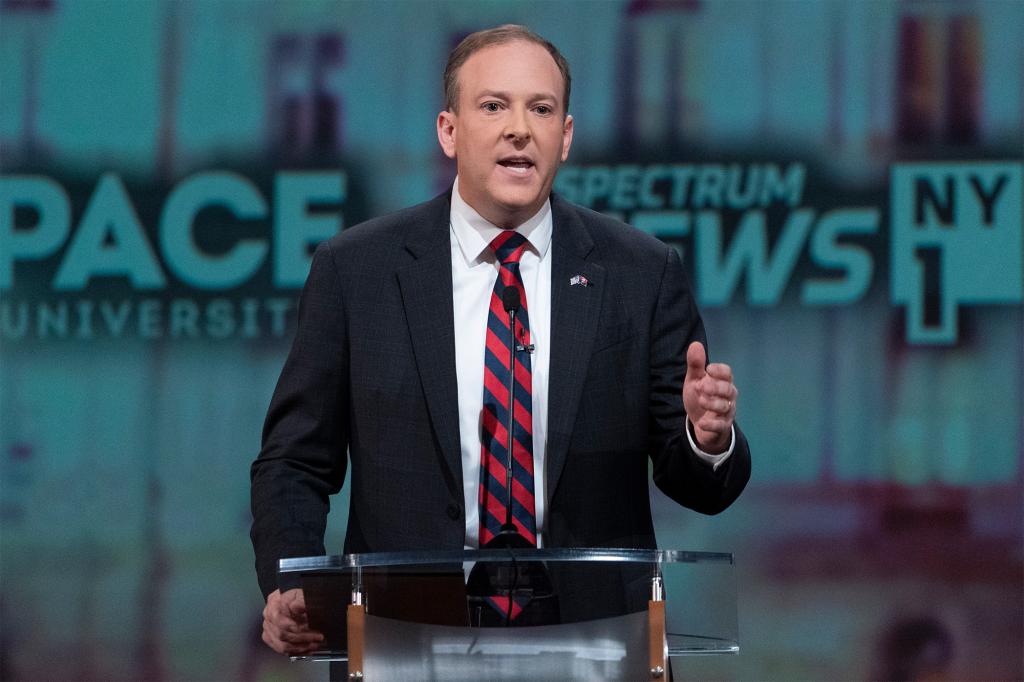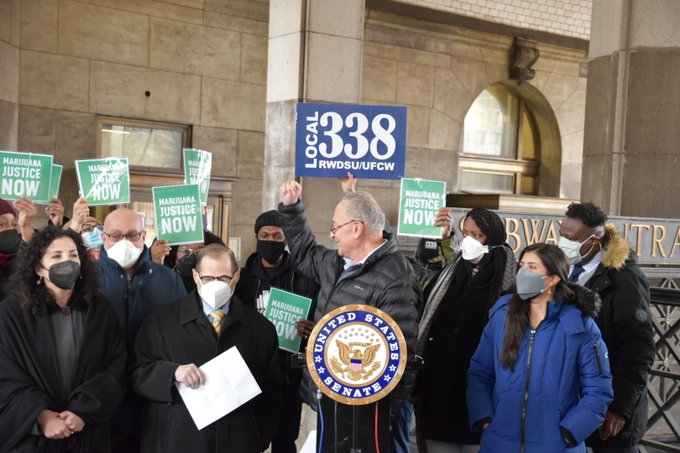Don't Mistake Lee Zeldin’s Empty Soundbites for Moderation

Lee Zeldin at the Spectrum News debate (photo: pool)
In 2020, I ran for Congress in Suffolk County on a platform of facts, truth, and evidence-based solutions for my local community. My opponent was Republican Rep. Lee Zeldin, who already had a long history in Congress of denying facts and relying on soundbites to take the place of real accomplishments. With the gubernatorial election happening now, New Yorkers need to look beyond Zeldin’s shallow rhetoric, and instead look at his record to truly understand the harmful agenda he will bring if elected to the highest office in the state.
Mr. Zeldin claims a mantle of “bipartisanship.” Unfortunately, as a member of Congress he accomplished little and voted with President Donald Trump almost 90% of the time. To hide this reality, Mr. Zeldin likes to claim credit for actions that are important to his voters, without doing the real work to make things happen.
For example, in 2020, Brookhaven National Lab (BNL), which lies within our district, was selected as home for the U.S. Department of Energy’s Electron Ion Collider (EIC), a $2 billion project that will bring jobs to our community. An independent panel of scientists had chosen BNL as home for the future EIC because it had the best combination of expertise and existing facilities to support the project. Yet Mr. Zeldin sent out a press release with the headline “Rep. Zeldin Steers Electron-Ion Collider Project to Brookhaven National Lab.” The release conspicuously did not include any mention of what Mr. Zeldin did to support BNL’s bid.
Meanwhile, Mr. Zeldin’s extremism includes serving as a staunch supporter and passionate defender of former President Trump. In Congress, Zeldin served as Donald Trump’s “point man” during both impeachment trials, and planned with White House Chief of Staff Mark Meadows on how to undermine the 2020 election results. If you want to understand who Lee Zeldin is, listen to the speech he gave on the night of January 6, 2021, after the Capitol insurrection, to justify his vote against certifying the election results. Each sentence is carefully crafted to be true in its narrowest sense, but taken as a whole, the speech is one big lie.
To this day, Zeldin skirts around the facts and fails to give direct answers so as not to upset his base. Asked recently by The New York Times editorial board whether he agrees that Joe Biden won in 2020, Zeldin avoided answering, instead saying, “I don’t know how to quantify nationwide what happened. All I know from the most personal of experiences was what we went through in the 1st Congressional District in New York.” Ironically, I lost to Rep. Zeldin in 2020, and he has never questioned that result.
To make matters worse, Zeldin has aligned himself with far-right ideologues. In 2015, Zeldin hosted a town hall with members of the Oath Keepers, an organizing group behind the January 6, 2021 insurrection. Likewise, he has welcomed the enthusiastic support of the Long Island Loud Majority, which has been identified as an anti-government extremist organization by the Southern Poverty Law Center.
Mr. Zeldin’s voting record is similarly extreme, including voting against the bipartisan infrastructure bill, against the John Lewis Voting Rights Act, against the Assault Weapons Ban, and for repealing the Affordable Care Act, to name just a few. Staunchly anti-abortion with a long record to prove it, he now says he will not try to overturn New York’s legislation protecting reproductive rights, but he has made no similar promise to continue critical state funding to protect those rights. Once again, Zeldin is crafting his message carefully, yet overall it is a giant lie, trying to trick more pro-choice people into voting for him.
Mr. Zeldin wants to be our Governor – a position of tremendous power and consequence for each of our day-to-day lives. I implore New Yorkers to judge him not by his big claims or promises, but by what his record and choice of friends tell us he would do if we hand him the keys to the governor’s mansion. Then, vote like our state depends on it.
***
Nancy S. Goroff is a Long Island resident and former congressional candidate. On Twitter @ngoroff.
***
Have an op-ed idea or submission for Gotham Gazette? Email This email address is being protected from spambots. You need JavaScript enabled to view it.
Empowering New York City’s Asian American Voters

Getting out the vote (photo: @SandraForNY1)
Asian Americans are the fastest growing racial group in the United States and in New York City. Yet for too long, Asian Americans have faced challenges participating in elections. We now make up over 17% of New York City’s total population, making us a significant part of the city’s racial diversity, cultural fabric, and electoral politics. However, we often are not included in voter outreach and face extra barriers to casting our votes. As we gear up for an important election, it’s time to acknowledge and uplift the power of Asian American voters.
Asian American Pacific Islander (AAPI) voter turnout has historically been stymied by language barriers and a lack of translated voter materials, which is especially impactful given that 45% of Asian Americans in New York City have limited English proficiency. We are also vulnerable to voter suppression tactics, such as higher rejection rates of ballots cast by Asian Americans and limitations on mail-in voting, which Asian Americans are more likely to use. This has placed the label of “unlikely voters” on our community, which in turn causes officials and candidates to not bother to engage with us, creating a vicious cycle.
With elections affecting so many important policies and services, from funding to safety to empowerment resources, it is more important than ever to keep in mind how New York City’s rapidly growing AAPI voting community will be affected.
Asian New Yorkers make up at least 10% of the population in more than one-half of New York City Council districts, but there are neighborhoods with concentrated Asian voters. In these concentrations, it is actually easier and more effective for candidates and campaigns to canvass them and make voting more accessible. Such as by making a few adjustments to the already existing system, providing interpreters at polling sites, or offering translated candidate and campaign information.
The good news is there are evidence-backed, actionable ways to break this cycle and make Asian Americans very likely voters. In a new study this year, the Asian American Federation’s AAPI Power Coalition measured the effectiveness of different voter outreach techniques and found that face-to-face canvassing and phone banking with multilingual callers were the best ways to directly reach Asian American voters with limited English proficiency.
Multilingual voting guides with practical information on how to vote also increased turnout, as well as leveraging community events in historically low turnout areas to create a stronger culture of voting. These tactics drove an 11-percentage-point increase in voter turnout among targeted Asian voters, compared to their non-targeted counterparts.
Asian Americans can also be better accommodated once we reach the polls with more on-site translators in the myriad of Asian languages spoken in New York City.
Already, we are seeing a growth in Asian American electoral participation. As the AAF report highlights, in the 2021 New York City primary, 27.1% of Asian voters cast ballots. That was the highest turnout rate of any racial minority group, surpassing Black voters at 26.5% and Hispanics at 17.4%. It was also an 11-percentage point increase in Asian voter turnout since 2013, the last time there was a competitive mayoral primary in the city.
As our community grows rapidly in both size and voter turnout rate, it’s clear that Asian Americans are poised to become a powerful voting bloc in New York. It is in the interest of all candidates and election officials to build the foundation now for our voices to be heard, with accessible, translated voting information and meaningful outreach.
***
Sandra Ung is a New York City Council member representing parts of Queens and Chair of the Council’s Committee on Governmental Operations. Jo-Ann Yoo is the Executive Director of the Asian American Federation. On Twitter @SandraForNY1 & @AAFederation.
***
Have an op-ed idea or submission for Gotham Gazette? Email This email address is being protected from spambots. You need JavaScript enabled to view it.
Senator Schumer, as New York Legalizes Marijuana, We Need SAFE Banking Now

Senator Schumer rallies around "marijuana justice" (photo: @SenSchumer)
I am a proud Long Island resident, mother of two, working wife, and cannabis entrepreneur. As an active and concerned member of the community, I urge U.S. Senate Majority Leader Schumer and other lawmakers to rally behind the common-sense Secure and Fair Enforcement (SAFE) Banking bill. The SAFE Banking bill would prohibit enforcement action by the federal government against financial institutions that provide services to the cannabis industry.
Now is the time to act.
In October, President Biden announced to great fanfare that he will pardon all federal convictions for simple cannabis possession, called upon governors to do the same at the state level, and requested staff to initiate “expeditiously” an administrative review process to remove cannabis from the list of scheduled drugs.
Currently, federal law classifies marijuana as a Schedule I substance under the Controlled Substances Act. This classification is reserved for the most dangerous substances with no perceived medical benefit. This schedule classification of marijuana is even higher than that assigned to fentanyl and methamphetamine, the drugs driving today’s overdose epidemic.
Cannabis is no longer viewed as a danger. Nevertheless, the War on Drugs still encompasses cannabis and targets minority populations. As New York legalizes the cultivation, sale, and adult use of marijuana, the State Legislature has begun to address long-standing inequities by adopting legislation that specifically calls for a majority of cannabis licenses to be granted to those most impacted by the discriminatory policies of the past and small, minority/women-owned businesses. These are terrific advances, but if lawmakers do not ensure that entrepreneurs have access to the sophisticated federal financial system, our entrepreneurial business advances are doomed to failure.
As it currently stands, banks and other financial establishments do not provide banking services to cannabis-related establishments, forcing them to operate entirely in cash and causing serious economic constraints. Without banking access through the passage of the SAFE Banking bill, the cannabis legalization effort will flounder — or worse, fail completely, and the illicit unchecked cannabis market will dominate.
The principal objective of cannabis legalization is to create and promote a safe environment and market for the safe distribution of cannabis. There are real dangers associated with any delay in taking real action to facilitate the formation and successful operation of the small minority-owned businesses that are and will be best-suited to be at the forefront of the cannabis market changes.
It is antithetical to this goal to deny the field soldiers access to the legitimate banking resources needed to operate safely and soundly. Adoption of the SAFE Banking bill, which has passed the House of Representatives six times and now sits in the Senate, would be a great start to addressing these issues and more.
Senator Schumer is one of several legislators that has publicly and vocally supported SAFE Banking and further cannabis reform – but we need more. I urge Senator Schumer and his colleagues to support this bill.
***
Beryl Solomon Jackowitz is a cannabis advocate and founder of Poplar, an online health and wellness website that sells hemp-derived CBD products.
***
Have an op-ed idea or submission for Gotham Gazette? Email This email address is being protected from spambots. You need JavaScript enabled to view it.




